|
 |
RSS Feed  |
a playground of art, photos, videos, writing, music, life |
|
|

You are here
|

Creativity!
|

Get it!
|

I like it!
|

Fun stuff!
|

About me...
|
| |
|
|
|
|
Random Quote
One of the least impressive liberties is the liberty to starve. This particular liberty is freely accorded to authors.
-- Lord Goodman
|
|
|
|
|
|
Blog Posts for March 2005
Home Page
Blog Archive by Month | Blog Archive by Story or Tag | Search Blog and Comments
 The image at right is for a friend of mine. I love my juicer, and use it about 5 times a week. Today's breakfast was orange/grape/green apple juice. Yummy! I'm trying to convince him to buy a juicer. His wife wants one, but he is unconvinced. But he'll be converted. The image at right is for a friend of mine. I love my juicer, and use it about 5 times a week. Today's breakfast was orange/grape/green apple juice. Yummy! I'm trying to convince him to buy a juicer. His wife wants one, but he is unconvinced. But he'll be converted.
Here's the list of To-Do items of the first phase of work here at beatcanvas.com: - Profile Page - those who register through login will get their own page devoted to a description of themselves. This is good for blog marketing.
- Comments Search - registered folks will be able to search the comments across posts.
- About page - yeah, I know, the About page at left goes nowhere. That's coming...
- Writing - um, ditto...
- Email Forms - registered readers will be able to email commenters through an email form here on the site. No commenter's email address will ever be displayed here - that's just a recipe for spam.
- Archives - this main page only holds 15 articles/posts. I need to build the archive page.
- New content should ping weblogs, technorati, etc - it doesn't yet, though I've researched it a bit.
After I'm done with this list, I'll stop enhancing the site for a while, but will still post daily. And by the way, I'm really enjoying the comments of everyone.Tomorrow, I'll post a list of the To-Do items for Phase Two. |
|
|
You can now search the comments... Give it a whirl! ETC: You can search articles. Emailing commenters works, although you must be a registered beatcanvas user to email. And the About page is done for now... |
|
|
During the election campaign, I noticed that Kerry's supporters tended to be very vocally grass-roots, whereas Bush's supporters, while likewise eager for their guy, were less likely to do such things as protest or gather into larger groups. I'm making a generalization, and I could be wrong, but in my opinion, it's a tendency of Democrats to swarm together to accomplish a cause. Republicans tend to be less grouped about it. Within their own circles, they link arms. But I think Republicans as a group are less likely to be as obvious. In support of my argument, look at how it was the conventional wisdom that a larger turnout in the election would favor Kerry. Democrats find safety in numbers. They are concerned about the world's opinion of the US, where Republicans are more concerned about the our basic needs of safety and security - and screw the world's opinion if they don't like how the US secures itself. At the root, I believe that Democrats and Republicans believe pretty much the same things. You'd be hard-pressed to find a Kerry supporter, for example, who believes that the US should not secure and defend itself. Most do. Likewise, I think you'd be hard-pressed to find a Bush supporter who doesn't want to help those down on their luck, if they can help. Homeland security is not the sole territory of Republicans, and compassion and willingness to help others are not exclusively the hallmark of Democrats. (In fact, red states donate more money to charity than blue states, relative to income, but I suspect in part this is due to religious beliefs.) An OODA loop is a mechanism developed by a fella named Boyd to describe how we make decisions. Essentially, we bring in information, we filter it according to our experiences, we then process it and act. OODA = Observe, Orient, Decide, Act. Keep that in mind as I move forward... Abraham Maslow was a psychologist who developed a well-known pyramid called the "hierarchy of needs." Maslow's premise was that we first concern ourselves with providing for for our basic needs - food, water, shelter - before we move on to satisfy other needs - love, relationships, personal growth, etc. Here is the order of his hierarchy: 1) Physiological: hunger, thirst, bodily comforts, etc.
2) Safety/security: out of danger
3) Belonging and Love: affiliate with others, be accepted
4) Esteem: to achieve, be competent, gain approval and recognition
5) Self-actualization, or realizing one's full potential Whether you lean left or right, all of these are necessary and healthy to who you are. I read somewhere recently that the difference between a liberal and a conservative is the perception of the relationship between the individual and the state. Liberals see an important and close-knit relationship between the individual and the state, where conservatives regard such a relationship with less esteem. If you relate that concept back to Maslow's hierarchy, the difference between a Republican and a Democrat is that a Democrat is more likely to view the 3rd and 4th tiers in a broader perspective. Academic recognition, civil involvement, international acceptance... these are, in general, more esteemed by liberals than conservatives. Why? To a firm Democrat, Maslow's 3rd and 4th tiers of acceptance and approval and community are integral to Maslow's 2nd tier of safety and security. Hence, "it takes a village." This is why Bush's foreign policy scares Democrats - it doesn't really care what the world thinks. "Safety and security in community." To a firm Republican, Maslow's 2nd tier is separate from and a precursor to the 3rd and 4th tier. Strong military, 2nd Amendment rights... rugged individualism doesn't really trust others to provide safety and security. This is why Kerry's foreign policy scared conservatives - the UN is the last institution they trust. "Safety and security - then community." Who's right? Actually, both, and I think timing is the key. The OODA concept dictates that our experiences will orient us in problem-solving. I'm going to think through some scenarios and present them later... At the moment, I find all of this fascinating to consider. |
|
|
The kids are gone tonight. Bari is at a basketball game, Nick is at his girlfriend's house, Aaron is off in his room, and Austin and Jacob are happy to have their mom back from the hospital and they are enjoying her.  So of course, I'm listening to Journey's Greatest Hits - loudly - and trying to wrap up the first phase of this web site. Steve Perry and crew get my vote for greatest band ever. Great songs, incredible musicians, and I'd love to sing like Steve. How can anyone not tap their foot to "Ask the Lonely?" Dude... We used to play a few Journey tunes in the band. You know, it's mighty hard to program this here web site and jam on the air guitar at the same time... 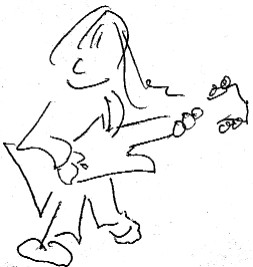 Fortunately, my neighbors haven't complained about my headphoned sing-along, so life is good. Oh, and the little drawing? That was how I depicted myself back in the days when I still had hair. Long hair and a permanent smile :)  That's my "senior" picture. Or at least it turned out that way. I graduated as a junior and my t-shirt - why, it's a Journey concert t-shirt, of course! |
|
|
I worked on the archives for beatcanvas.com and got them up and running. You can see them in the left column. Started work on User Profiles, but ended up talking to my teenagers instead - more fun. I only have a few more items left for Phase 1, and then I'll take a programming hiatus from beatcanvas for a few weeks to work on writing a support software package for a client. (Of course, I'll still post to the blog here...) I learned today that my consulting contract with Wells Fargo Home Mortgage has been extended through June 30, although I suspect that I'll be working there through the rest of the year. It's nice to have steady work. |
|
|
 It is a such a beautiful day today. Go outside and play for a while... It is a such a beautiful day today. Go outside and play for a while...
|
|
|
It's been over a month since I last painted. And like, I forgot how. For the last month, my brain has been in high gear to get this web site done. Lots of lots of left-brained activity. In that mode, I think fast and I run at it to get it done. Plus, I've had some high octane projects to do at work, so speed has been my way of getting around. But not so with painting. It's about slowing down, and getting to know the subject, and seeing past my preconceptions. Which of course, I didn't do. I bought a grill today. It was a cheap grill, but a grill nonethless, and I'm probably the only 40-year-old man in America who has never used a gas grill in his life. So in honor of my first grilling and since I've been away from it for so long, I thought I would paint. I chose a picture of a red pepper and onions, which was part of tonight's very scrumptious steak dinner.  Nice picture. And in my mind, I thought, well this should be easy. But that's the trick, see. Every painting is equally as "hard." I forgot to rid my mind of the idea that I'm painting a red pepper and a sliced onion. So my first attempt at this gorgeous red pepper looked more like a sketch of Bob the Tomato.  Painting is good for me. I'll take a crack at this in the morning. |
|
|
It is the next morning, and I've slowed it down a bit. I started with an outline sketch...  My sketch is a bit taller than the original picture, but I'm okay with that. On to the color, eh? Let's start with the pepper itself.  When I first looked at it, I wondered if I had a red bright enough to paint this. I mean, that looks like a brilliant red. But on closer inspection, other colors began to come out. It's not really a true red; it's more of a rich pink. There's a bit of white in it. And there is yellow and purple in the highlights. To confirm it, I loaded it into Microsoft Photo Editor and zoomed in. Check this out.  You see the yellow and the purple? And then I color-matched the reddest pixel in this close-up and its RGB value is red-255, green-29, blue-21. The green and the blue make a white shade when combined with the red, so this is like 8 1/2 parts red and 1 part white. Also, at this close view, you forget that it's a red pepper. I believe that anyone could paint that little swatch and be fairly accurate. Why? Because it's no longer a red pepper. It's now just colors: reddish-pink, yellow, purple, and white. Paint a bunch of little swatches like this and it's - ta-da - a painting of a red pepper and a sliced onion. It's hard work to unlearn. It's also critical to learn how to do this. The Creating Passionate Users blog has a very succinct post on this. Yes, we're under pressure to learn more and to learn quickly, but the future goes to those who can unlearn faster than the rest, because you can't always learn something new until you first let go of something else. And learning to let go of rules is one of the first things we (and our managers) have to learn to be quicker at.Sometimes that means letting go of something that served you well for a long time. They point to smart guy, John Seely Brown. Go read it.All of this is a good reason why today's schools don't teach what people need to know - especially MBA colleges. Jack Welch said, "I am convinced that if the rate of change inside an organization is less than the rate of change outside, the end is in sight." The same could be said of us. I think seeing truly and unlearning are two of the greatest skills in life. |
|
|
Worked for about 15 minutes on the red pepper. Time constraints prevented more work on it, but it's better than what I had first done yesterday. And no longer resembles Bob the Tomato.  |
|
|
Tonight was Austin's 2nd grade choir concert, and he got to dance in part of it. I took my little Sony Cybershot and recorded some of the performance. You can view it here. Just before the show opened, all of the kids, plus Nick's girlfriend, were standing out in the hallway and I told them to stand still for a picture. They didn't know that instead of a still picture, I was recording their every move. So after about 1 minute, they started to get a bit, um, antsy about standing there. This next clip opens with Austin smacking Nick in the leg for tickling and pestering him. My daughter then wonders, "Dad - you got it?" Because, of course, there has been no flash. So, I ask that they stand there for a bit more, until Austin is floating in mid-air and grabs his sister's shirt for help. Take a look ;) |
|
|
I had to go shopping tonight for both groceries and a new phone battery. Not far from home, there's a Costco and a Best Buy. Since I had my camera on hand, I decided to record a little comparison pricing. Is a Costco membership worth it? At random, I compared three items in each store: an HP Printer, a Hoover vacuum, and a Philips TV. (I apologize in advance for the fuzzy images. I recorded it as a movie as I walked by the items, and then had to capture the video after I got home.) The item on the left is Best Buy. The item on the right is Costco. As you can see, Costco does in fact save you quite a bit of money. Now, in fairness, the fella at the Best Buy told me that Best Buy would meet the price of competitors when better, as long as the competitor had the item in stock. But how are they going to prove that?? Sounds like a lot of time to get the same price that you can already get at Costco. Costco wins, although they didn't have a replacement battery for my phone. That's why I had to go to Best Buy... Tomorrow, I need to swing by Sam's Club as I will be in that area. I'll compare more items to see if Costco beats Sam's. Oh, and gas was $1.83 at Costco. Is that a deal? Better than other places, but mercy - my F250 sure eats that stuff up fast. Hard to be a deal at that price level. |
|
|
In this spine-tingling final installment of my bit of price comparison, I present Sam's Club vs. Costco. Let the battle begin... Yesterday, I mentioned that Best Buy wasn't much of a competitor to Costco. I went to Sam's today to get a few items and tried to price the vacuum, printer, and TV that I found at Best Buy and Costco. But I couldn't find two of the three. It was obvious that Sam's Club had a much smaller selection of printers, TV's, and vacuums. But here is the comparison of the vacuum, with Sam's club on the left: | Vacuum |  |  |
Again, Costco wins. For what it's worth, I did find the same HP printer next door at the Wal-Mart. We had to go there to get my son a notebook for school. Here's Wal-Mart's price on the left, Costco's on the right. | Printer |  |  |
I did find other, more household-type items at Sam's that I could compare to Costco. Here they are, with Sam's Club prices on the left and Costco on the right. | Cheerios |  |  | | Mach 3 Razors |  |  | | Yukon Jack |  |  |
I own "memberships" to both. My goal was to learn which is better for my wallet. Costco wins, because Sam's Club can't offer me anything at a better price. |
|
|
A couple of days ago, I posted about Abraham Maslow's Hierarchy of Needs, and how that lens can help to focus on the difference between between Republicans and Democrats. My main point: Liberals give greater weight to Maslow's 3rd and 4th tiers, which are a sense of belonging and esteem from others, and they see this as important to Maslow's 2nd tier, which is Safety and Security.I summed this up as "Safety and Security in (or through) Community." Conservatives, on the other hand, see Maslow's 2nd tier as pre-emptive. First safety and security, then be concerned with a sense of belonging and esteem from others. I regarded this as "Safety and Security - then Community." You can read that post by clicking on the "View Thread" link up above.Thinking it through some more, there are two axes that brace this thinking. 1) Individual Responsibility vs. Shared, or Group, Responsibility. It's "Do It Yourself" vs. "It takes a Village." 2) Apathy about the opinions of others vs. wanting group decisions and a sense of moving ahead together. So I created a simple chart to represent these two arcs. 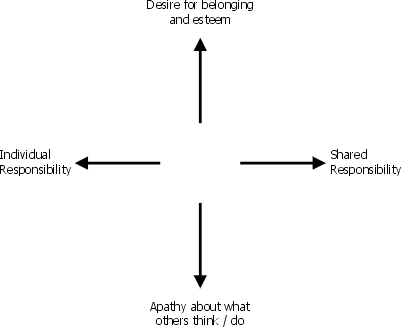 At times, each of us occupies a position on either axis. We can perch comfortably in any quadrant. There is a time for every position available. I mentioned the other day that acting alone for safety and security first is at times important, and that there are other times when acting in concert with others is best. But neither position is right all of the time. For example, a person could consistently give all of their money to others, and pay the most essential of their bills for themselves. That sounds wonderfully selfless, but it's well-understood that a person who saves their money can earn interest or dividends on the money saved, and thereby actually give more throughout their life because of their sturdy financial position. Safety and security through "selfishness" first - before concern about the opinions of others. There is a time to think first by yourself, and a time to think as a group. If a neighborhood in plagued by a redundant burglar, the people are best served by acting together and watching each other's homes rather than just watching their own. Safety and security through community is stronger for the numbers. After drawing up my little chart, I then went to each quadrant and thought about it. Here's what I got: 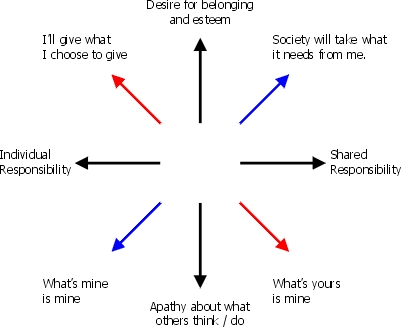 True? From this, what makes for the best society?
Where would America sit on this chart?
Where would you sit on this chart in your political and personal values? I'll close this post with something Joseph Tainter said in his book, "The Collapse of Complex Societies." He found that, in studying the collapse of many societies, the return on investment for greater complexity yielded diminishing results. In his conclusion, he said: There are two general factors that combine to make a society vulnerable to collapse.First, stress and perturbation are a constant feature of any complex society. Yet a society experiencing declining returns is investing ever more heavily in a strategy that is yielding proportionately less. Excess productive capacity will at some point be used up, and accumulated surpluses allocated to current major operating needs. There is, then, little or no surplus with which to counter major adversities. Unexpected stress surges must be dealt with out of the current operating budget, often ineffectually, and always to the detriment of the system as a whole. Even if the stress is successfully met, the society is weakened in the process, and made even more vulnerable to the next crisis. Secondly, declining marginal returns make complexity a less attractive problem-solving strategy. Where marginal returns decline, the advantages to complexity become ultimately no greater (for society as a whole) than for less costly social forms. The marginal cost of evolution to a higher level of complexity, or of remaining at the present level, is high compared with the alternative of disintegration. Under such conditions, the option to decompose (that is, to sever the ties that link localized groups to a regional entity) becomes more attractive to certain components of a complex society. Many of the social units that comprise a complex society perceive increased advantage to a strategy of independence, and begin to pursue their own immediate goals rather than the long-term goals of the hierarchy. Behavioral interdependence gives way to behavioral independence, requiring the hierarchy to allocate still more of a shrinking resource base to legitimization and/or control. In short, efforts in constantly increasing the complexity of a society are ultimately doomed to fail, as history shows. Unchecked investment in complexity actually invites the breakdown of society because of the lousy return on ever-escalating cost. Finally, the people get fed up with it. In the past, this was achieved by bloody revolution or by the state's waning power and relevance.The one mechanism though that could change this is: democracy. Thoughts on that will be my next segment in this series. |
|
|
I've been looking at the difference between liberals and conservatives through the lens of Maslow's Hierarchy of Needs. And I've been wrong, I think. It's through the further consideration of this that I need to expand it. I had said before that liberals see safety and security through community. Theirs is the "It takes a village"/"safety in numbers" mindset. Safety and security are in Maslow's second tier of need. Physical needs are in Maslow's first tier. But I now believe that liberals see physical needs as a group responsibility as well. For example, they believe that the homeless deserve a home, and society could cover that expense. The unemployed should have money, and society could cover that allocation. Now, I'm asserting that Maslow's third and fourth tiers, which are "belonging" and "esteem," are represented by the concept of community. If that's correct, and if liberals really do believe that physical needs and safety and security are the responsibility of the community, then liberals have inverted Maslow's hierarchy. Liberal Tier 1: Community (first and foremost)
Liberal Tier 2: Physical needs ensured (through community)
Liberal Tier 3: Safety and security (through community) Humans are born into the first community: family. And if you look at it from this point of view, they're right. A conservative, on the other hand, will most likely agree with the original order of Maslow's Hierarchy: Tier 1: Physical needs
Tier 2: Safety and security
Tier 3: Belonging
Tier 4: Esteem
Tier 5: Self-actualization (self-satisfied achievement) And a conservative will most likely believe that these are individual responsibilities. They see it as chicken and egg. How can an individual aid society if they themselves aren't secure? But in a fascinating way, a liberal would say, "Exactly! And the community should help firm up the person so that they can get back on their feet and help others." This is where the branching starts. Children are born into community and the community around them does provide their needs, but as they grow into adulthood, their independence is expected. What happens if they run into trouble? We all do, at times. A bit of assistance is sometimes helpful to society in the long run. Letting it run on and on though is not unproductive. It may sound odd to say it, but what benefit is there in domesticating humans? I'm sure you've heard concern before that if someone takes in a wounded wild animal, they actually threaten its chances for survival in the world if it is kept and fed for too long. The animal, accustomed to fending for itself in the world, becomes "tame" because it is so cared for every day. So how can a person responsibly release it back to its natural element? Keiko, the famous orca whale, is the most notorious example of this. Is this less so with humans? Some would argue - on both sides of the political spectrum - that prolonged welfare during the 60's, 70's, and 80's hurt people and society more than it helped. Society is strongest when each individual has reached above Maslow's belonging and esteem. Community is important and needful, but it is not enough. Maslow's concept of self-actualization serves everyone best. It means reaching our individual, full potential. Strangely, some liberals despise the high achievers of life. Not all - some very entrepreneurial folk are quite liberal. A good friend on mine, with whom I had lunch today, is both a staunch Democrat and is very involved in entrepreneurial pursuits. My question, though: how does a liberal mindset advocate individual achievement and contribution to the group? What happened to "Ask not what your country can do for you, but what you can do for your country?" I'm not trying to disparage anyone at all in this. I'm simply trying to understand how it is that people can both believe in the concepts of safety/security and helping one another, and yet arrive at totally opposite solutions. Are both valid? Yes, but I think a very strong definition of community is necessary. I don't consider Muslim extremists to be in my community. I don't consider those who hate America to be in my community. Wish harm on our military? You're not included. Community starts with a common interest. The greater the commonality and shared goals, the more I'll trust my safety and security and even physical needs to someone - be it an individual or a nation. Some liberals, it seems, want to include all of humanity in their community. Except that some of that "community" wishes that we die. Where's the common interest? It's silly to include such people in any community. Pull it back a little further... the French, the Germans, the Russians, the Chinese... they don't have our national interests at heart, do they? Why should we seek their advice or consent about safety and security? Why should we trust the U.N.? Why should they be included in a community? Shouldn't the goal of community be to strengthen society, its people, their livelihood, their quality of life? Is that what "belonging" and "esteem" is about? |
|
|
More progress on the vegetable still life.  Comparatively, painting a face or a complicated street scene is much easier, I think, than painting a simple vegetable. For that reason, I'm enjoying this. I'm applying the washes and getting a sense of the detail. Still using big brushes for this. And for some reason, my monitor has taken to an occasional flickering that removes all of the red and leaves only blue/green. Which makes a red pepper look more like an eggplant. I hope to finish this during the weekend. I have all five kids this weekend, and they like watching me paint. You know, when I'm programming, I'm not social at all. But when I'm painting, I actually like talking with people while I paint. Jacob and I discussed the finer points of silent "e" as I painted. He was reading a book, and the notion of long and short vowels is a new concept. He's in kindergarten, and his progress in reading this year has been wonderful. So he sits in the chair next to me and makes comments as I paint ("Dad - that's pink. I don't think it's pink like that in the picture.") And reads a snippet or two from his book. Or asks about words that are complex. Later, we'll probably watercolor together. One of my favorite books - just to look at - is The Treehouse Book. And we're not talking little simple treehouses... no, we're talking houses in a tree.  Now that's a treehouse.  I find this sort of thing very appealing. |
|
|
The Tusk & Talon says it well: Like a computer virus, relentlessly chewing up your hard drive, the trend of recent court decisions has been to declare the Bill of Rights and the concept of federalism as no longer applicable. A case in point is the recent legal ruling ending the internet exemption of the BCRA (McCain-Feingold campaign reform). First, the Supreme Court decided that paid speech is not FreeSpeech as the plain text of the First Amendment says. Then, a lower court judge interpreted that decision to mean that bloggers’ free speech is also not Free Speech.These ludicrous situations wouldn’t occur if even five members of the Supreme Court would simply read words such as these rather than try to force meanings into them: "Congress shall make no law respecting an establishment of religion, or prohibiting the free exercise thereof; or abridging the freedom of speech, or of the press; or the right of the people peaceably to assemble, and to petition the Government for a redress of grievances." Realistically, our best bet is to appoint some judges who understand the intent of the Constitution was to limit what government can do, not to limit what the people can do. The next few years will likely see the appointment of enough judges to determine whether the founding principles of this nation will be respected or further eroded. Go sign the non-partisan petition to stop any thought of regulating free speech on the Internet. |
|
|
And now for the finer brushes...  You know, oftentimes we start out with a rough sketch in our heads - a vague notion - and if we bother to take repetitive passes at it, we hone it and make it better and it starts to come together. Not just about painting or drawing, but anything in life. Persistence will hardly ever bring failure. A friend of mine has a favorite quote that goes something like: It's not success or failure that defines us, but the effort. It's all about the journey. Which is why we shouldn't be afraid to just stick our feet into whatever it is that we wish to do. |
|
|
 Bernie Ebbers is convicted. Go to jail, scumbag. I'm very pro-business, but smarmy guys like him need to be put away. Bernie Ebbers is convicted. Go to jail, scumbag. I'm very pro-business, but smarmy guys like him need to be put away.
I never thought I would say this, but thank god that Democrats equal Republicans in the Iowa Senate. They won't vote in the House-approved Iowa constitutional marriage amendment, I'm sure. It's a simple concept: government has no business in the private property or private lives of its citizens where no one is getting hurt. Grr... stupid Republicans. It's the one part of conservatism today that nauseates me. President Bush is looking better by the day in the Middle East. Check this out: Asking more people what they thought of Americans turned up the same refrain. From a young driver, Fadi Mrad, came the message: "We want to change. We need freedom. Please don't let Bush forget us." From a group of young men came not only the message "Our hope is America," and "We believe in democracy in the Middle East," but also praise for Deputy Secretary of Defense Paul Wolfowitz. There was also an invitation from one of them, young Edgard Baradhy, for his heroine, Ms. Rice, to come to Beirut "and I am ready to take her for coffee." Alan Greenspan repeats that he likes Bush's economic policy. But then, so does the economy.And now, I'm off to play some catch football with my sons. Woo hoo! |
|
|
Kris has this up on her web site and as I babysit the newly coded morning process today, I thought I would throw in my answers. If you like, throw your answers in the comments... What's your favorite kind of cookie? Generally, the kind before they're cooked. It's terrible, but I like dough. Pass the spoon, please. Who's America's most overrated actor? Kris gave this answer, to which I must agree: "My opinion? Jack Nicholson. Please don't kill me, but it's been a very, very long time since I've seen him playing anyone but himself." Amen, sister. Name a guilty pleasure. I like to peel the upper strip of paper off a new straw and then blow the bottom part off the straw. Outside, inside - it doesn't matter to me. Which means that I occasionally litter. "Scrubs" or "Everybody Loves Raymond"? Scrubs, no question. It's so random, it's hilarious. Name two things you can't live without. Music, and now a paintbrush. Your first pet's name + first street you lived on = your pornstar name. Harley Heights - lol... what a great formula. What song are you listening to right now? Low, by Kelly Clarkson Name your celebrity crush. I don't really do celebrity crushes - always seemed a bit silly to me. But a female celebrity with whom I would like to have lunch? Probably Marg Helgenberger, from CSI. Favourite punch line from a joke. In Scottish brogue: "I don't know where you were last night, lad, but I'm damn glad that you won first prize." And I'll add a few more... Secret, selfish wish? A regenerating body for a life hundreds of years long. Secret, unselfish wish? That every child had parents who truly loved him or her and showed it by spending time with their child. Sidenote as I write this - my daughter gets home early from school a couple of days a week and watches Dr. Phil now and then. She watches the other day and this 9-year-old boy was getting into torturing animals and hitting his sister until she would bleed. Dr. Phil's formula to save this kid? Dad, start spending more time with your son and as a family, go out and do stuff together. And yep, that fixed it. What if Jeffrey Dahmer's parents had done that? What duo in TV history are you most like? Kirk and Spock. Sometimes, I'm that corny, over-dramatic human that Kirk was, and other times I am that seemingly cold, hard-logic guy that Spock was. People would raise an eyebrow if they knew what about you? I have to give two answers, because some people know the first one: I voted for Clinton twice and now for Bush twice. Second answer: I take my showers in the dark. (Don't knock it till you tried it... but it has to be completely and utterly dark.) |
|
|
 Today, the Bush administration cleared the hurdle of the Senate for drilling for oil in Alaska's Arctic National Wildlife Refuge. It barely passed - 51 to 49. Is this a good thing? Today, the Bush administration cleared the hurdle of the Senate for drilling for oil in Alaska's Arctic National Wildlife Refuge. It barely passed - 51 to 49. Is this a good thing?
I went to the dentist today and while waiting, I picked up Outside magazine. Never read it. As I did, it reminded me of Wired in its style, but for nature lovers instead. In it, John Kerry gave it both barrels in his opposition to drilling in Alaska. His summation: We can't drill our way to energy independence. We have to invent our way there, by harnessing the entrepreneurial spirit that made our country great. We can conserve energy and make our cars run farther on a gallon of gas. We can increase our investment in clean-energy products and create hundreds of thousands of jobs along the way. What we can't do is buy into the myth that America's energy future lies under the snow of ANWR. Is he right? I didn't know, but I wanted to check out more of what the magazine had to offer when I got home.I looked it up and found Kerry's article, but also found that Outside had published several other articles on ANWR. One is by a guy named David Masiel who spent a lot of time in Alaska with oil companies and he's now a journalist and did his homework. He says something that needs to be said: Both pro- and anti-drilling camps have dug their heels into the Arctic permafrost, each side deploying an array of facts and statistics, all of them "true," and most mutually exclusive.After a journey that took me back to the Arctic for the first time in 13 years, and through dozens of interviews with policy analysts, native Alaskans, wildlife biologists, and congressional staff experts, I became convinced of only one thing: Both sides are far too entrenched to see the other side clearly. Stefanie, a couple of days ago in the comments here at beatcanvas, took me to task for not discerning propaganda. She has a good point, which David Masiel also emphasizes: in any debate, people round up the facts best suited to propel their argument, and then they push ahead with their agenda. It's tough frankly to know what's true outside of our own experience. I have to rely on intelligent and apparently even-handed articles like David's to help me steer through the marketing. You should click through the link and read the article. It's compelling and it makes sense.The industry's main argument is that oil production is dramatically cleaner than it was in what drillers like to call the "ram and cram" days. Now, drill bits as small as my fist snake their way four miles through the earth to previously inaccessible reservoirs, and isolated production "islands" make the sprawling well pads of old seem like vestiges of the Stone Age. In 1970, a 20-acre drill site could access 502 acres of subsurface area; by 2000, a six-acre site could reach more than 32,000. While industry touts this ability, watchdogs like the Wilderness Society charge that those claims are exaggerated: Extended-reach drilling isn't used as often or as effectively as oil companies would have us believe, and ice roads, lauded as the replacement for gravel infrastructure, place enormous stress on freshwater resources, something the 1002 doesn't have in abundance.I wanted to see for myself.... As so he did. The result is a good article that lands somewhere in the middle of the argument.Environmental groups point out that ANWR oil isn't going to make or break any of this—it's simply one field, a six-month supply to gas-guzzling Americans. But that assumes that ANWR oil would be the only source of energy used, a logic that, if applied elsewhere, suggests we'd burn through the Prudhoe Bay field, the largest in North America and in operation since 1977, in two and a half years. According to the United States Geological Survey, there are between 4.3 and 11.8 billion barrels under the 1002. At the current market price of $30 a barrel, the USGS estimates that 6.3 billion of those barrels are economically recoverable, compared with 5.6 billion in the NPRA, an area 16 times as large. That's a significant field by any reasonable measure.Drilling opponents are right about American consumption, however: Conservation could save more energy than ANWR will ever provide. We can't produce our way out of dependence on foreign oil, and a comprehensive strategy for alternatives seems necessary if not inevitable. The Sierra Club, the World Wildlife Fund, and Greenpeace all argue that conservation is the cheapest and fastest way to make up for ANWR crude, and the National Resources Defense Council points out that the hype about hydrogen cells misses the mark, since the technology already exists to make 40-mile-per-gallon SUVs. But the two easiest ways to conserve fuel are to drive smaller cars and drive them more slowly, choices that have been available to the American consumer for a long time. I'm all for conservation - it's a best practice, without a doubt. Me, I'm a contradiction: I ride my bike all over Des Moines, but I drive a Ford F-250 V-10 pickup. I know a lot of "environmentally-concerned" people who choose plastic, not paper, leave their lights on, use lots of water for their green lawn, and think recycling is too time-consuming to get disciplined about. And, of course, they drive SUV's, not a Prius.David Masiel closes with this: Compromise is never easy. And I suggest this one with a huge caveat: The public has a right to police this development. If the oil industry wants ANWR, the developers have to earn the public trust. The only way to do that is to open themselves to a new form of oversight, and not by the government. Rightly or wrongly, regulation tends to cause adversarialism—a feeling I know all too well. It leads to circumvention if not outright corruption. Substantial oversight should come from those who know the most and have the most at stake: environmental groups, scientists, and native Alaskans. He's advocating transparency. Yes, exactly. As it should be.It's tough to navigate the propaganda out there. I tire of talk radio. It's informative, but with a big skeptical ear. Newspapers, same deal, but less obvious. It was nice to read an article from someone who wanted to discover the issue for himself. |
|
|
A quick rant: this is a democracy, where the majority wins. I don't really care who's in office - if they're in office because they were elected, then the Senate ought to have the right to vote for the judicial nominees appointed by the president. Period. Anything else is not democracy - it's politics and subversive. If the other side doesn't like the judges appointed, then they should vote against them and aim to win in the next election to send up the appointees they'd like to see in court. But to constantly threaten filbuster is childish. Grow up. |
|
|
Still Life, Um, Standing Still |
I took today off work, which was fabulous. I slept for a while, hung out with my kids, who are on spring break starting today, and I painted. Here's the current red pepper and onion painting, with a view of the transitions between each sit down.  



 But now what? It needs a background, but I don't know what I want to do with it... cutting board? Plate? Dinner table? Fade to white? Beats me... I'll noodle it through. Aaron has his friend, Sonny, over and they are conquering the Covenant in HALO 2. 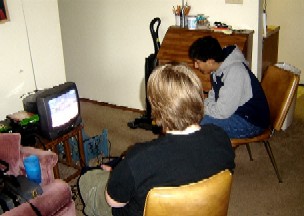 He'll be staying for dinner tonight. Should be a great evening here at home. I am so glad that I took the day off. ETC: The kids all like this painting. My daughter, who is smart about things like this, suggests that I paint a black-and-white tiled countertop. That seems smart to me because it's a good background without detracting from the color of the pepper and onion. ETC, ETC: After scrounging through Google images and doing some sketching, I think a gray marble tile countertop would be nice. A pattern, even as simple as black and white, would pull too much from the focus of the vegetables. |
|
|
I have a favorite playlist in my Windows Media Player that I call "Optimism." Tonight, I hopped onto MusicMatch and downloaded Boston's "Don't Look Back," which seemed to me to sandwich perfectly between the B-52's "Love Shack" and Squeeze's "Tempted."  It fits well - or at least it moves easily from "Love Shack" to "Don't Look Back," but I forgot that its ending is one that seques into another song, so it just kind of drops off and then the perfection of "Tempted" begins. A little awkward, but I like the song too much to leave it out. You know, music is so much fuller with headphones on. I'll be getting lots of that starting tomorrow night. The older kids go up north to visit their Mom in Minneapolis. And then, I'm on my own for a few days till they return on Thursday. I have a few things to do in the meantime. A former client needs me to add a few enhancements to their quoting system that I developed for them. The red pepper painting simply must be finished. And I'll be doing some work here, on beatcanvas.com. I hope to release a feature that I call Graffiti.  It's basically a second blog here, but it's one that you commenters and readers will run. If you register yourself on this site, you'll be able to add articles/posts to the Graffiti section and others can comment. Should be fun... I look forward to seeing what people have to say. In the meantime this evening, I'll hang out with my sons and try to recover from dinner.  Barbecued chicken, pineapple, lots of veggies... yummm... |
|
|
Obviously, big news this week has been the court fight between Michael Schiavo and Terri Schiavo's family. Death by dehydration/starvation is diabolical. We're not allowed to do that to animals. But we can authorize it for a human? I don't think that a person in a coma/vegetative state should be kept alive at the depletion of all money of the family. For example, if I were in such a state, I wouldn't expect my family to engage in extraordinary measures to maintain my existence. My kids' needs come first, and they don't need to be broke for life at my expense. BUT! If money were no object, or if they chose to keep me alive, then alive I should be. In Terri's case, both are true. There are enough donations to pay for all her needs for life, and her family wants to keep her alive. I don't think Michael Schiavo's argument holds any water. He says that he's allowing her to die killing her because it's what Terri wanted. Michael Schiavo was at his wife's bedside after the tube was removed and said he felt that "peace was happening" for her. "And I felt like she was finally going to get what she wants, and be at peace and be with the Lord," he said. "Peace was happening" for her? If she's truly in vegetative state, she was at peace long ago because she is aware of nothing now.So either she is aware and peace can "happen" for her now, and therefore she should be kept alive... ...or she is unaware of anything at all, and there's no harm in keeping her alive. Changing her condition won't bring peace or anything to her - she's incapable of it. In either case, there's plenty of money and her family wishes to care for her. Conclusion: Michael Schiavo is a dirtbag who has painted himself into a corner. ETC: The Republicans (certainly not the Democrats) have passed legislation to clear the road. Michael Schiavo's reaction: "This is a sad day for Terri. But I'll tell you what: It's also is a sad day for everyone in this country because the United States government is going to come in and trample all over your personal, family matters," he told ABC's "Good Morning America" on Monday. Sorry buddy, but when she is no longer your family, this is not your personal family matter.Michael Schiavo has another woman now, and children by that woman - he can't be considered Terri's advocate, or even her family. He's committed adultery... and then some. He's not a loving husband. He wants this to be over so that he can marry his new woman. When the family has hope for their daughter, and when money is no object, why kill her? |
|
|
Peter Singer is an ethicist who works at Princeton. His position, put forward in his papers, is that "the right to physical integrity is grounded in a being's ability to suffer, and the right to life is grounded in the ability to plan and anticipate one's future." Thus, those in a vegetative state or those severely retarded enough to be unable to plan for their own future should be euthanized, or killed. But Peter stepped back from his own determinations when his mother suffered from Alzheimer's. He did not kill her. Instead, he said: "I think this has made me see how the issues of someone with these kinds of problems are really very difficult." Taking an innocent life is a huge and permanent step, and if people are willing to expend their own lives in the care of someone else, however retarded, then why should they not be allowed to do so if they themselves see a reason for hope?Who is the arbiter of hope? Society? Congress? Judges? Disinterested spouses? There are many whose retardation was severe enough that no one thought there was any hope, and yet some of these people defied all odds and became cogent and partially functioning. In each case, it took a person who saw that hope and determined that they would make the effort necessary to help someone else. Most often, this person is a parent, and their love alone can achieve great things, If that is their choice, why should they be stopped from doing so? I think the final arbiter of hope is the person who is hopeful. In the case of Terri Schiavo, the hopeful count among the millions. ETC: I'm really much more torn about this issue than I expected to be - I don't know why it's sticking with me as it is. Running through my head... - Should the law ever allow euthanasia, whether directly in the form of injection, or indirectly in the form of neglect?
- Should someone have the right to determine the "quality of life" for another person who can't determine/define their own quality of life?
- In marriage, you literally share your life decisions with another person. When does that privilege stop? At divorce? At the time that a person moves on to another relationship?
- As the parent of my five children, how restrained could I be in the fight to try and save my child from a death like Terri's? (I think her parents have shown amazing restraint...) I imagine my son, Nick, appearing as Terri does. If I thought that he was receptive to me, I think you would need a tranquilizer gun to subdue me from getting to his room to re-insert that feeding tube.
Very heavy stuff. |
|
|
Bella emphasizes in the comments that we all need to get a living will to remove the painful decision from our loved ones. She's right. She suggests nolo.com, but after going there, it's less than clear how to obtain a living will. So I scouted around and found LegacyWriter online for $19.95. It was pretty easy to do.  So do it, if you haven't already. (P.S. Whoever chose their web site colors of dingy yellow and slightly moldy dingy yellow needs to be fired.) |
|
|
My sister, who lives in Kentucky, stopped up in Ames to visit my mom and so I went up last night to spend time with everyone. It's a shame that my kids are all out of town, but you know, with it just being my mom, her husband, my sister, her two kids, and myself at the table, it was very nice. With my five, it, uh, would'a been crowded. 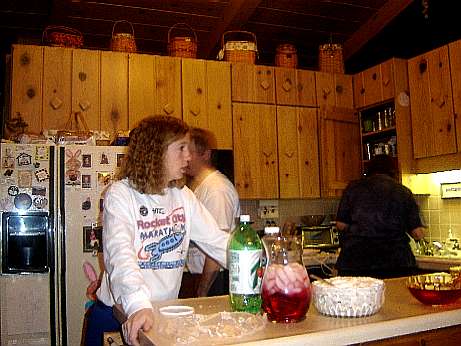 Traci and I laughed ourselves silly over Patrick Stewart's narration of Dragons!, an Animal Planet show. He was so serious... hell, between him and that guy on the All-State commercials, if either of them try to sell me something, I'd buy it. Their voice and presence are enough to get my head just bobbin'... "Yes, sir. Where do I sign." Traci too.  That's my nephew, Logan. Cutest kid. He'd have the four faces on Rushmore beaming from ear to ear if he ever got near them.  And Mackenzie, my niece - ready to take on the world. Later, it was pinochle. I'd never played. Well, maybe once, but it was ages ago. So I had to re-learn, and I did so quickly, but not fast enough. My sister is the most competitive person I know. She'll be running in the Boston Marathon this year. So, she took our loss at cards with, um, politeness - lol I wish they lived closer than Kentucky. Not gonna happen though... in a few years, Mom and Kerm will move to be near Traci when Kerm retires. That'll leave me to hold the fort here in Iowa. And I'm here for at least 12 years. Jacob will only be in the first grade next year. |
|
|
Absence Makes the Heart Grow, um, You Know, Fonder |
Listening to the radio on the way back to work from a lunch at Boston's (yummy - pizza), I heard that a delinquent kid at a school was acting out, and the school called the police because of the chairs and such being thrown. So now, the parents of the young jerk are suing the school. Now, it might be me, but how stupid can you be as a parent to sue the school after your child acts like that? Worse, a recent study said that 8 in 10 teachers have heard a student suggest that their parents will sue the school when the child is corrected for being an ass in class. So I have a suggestion: I think schools should close for 1 month. In February. Unannounced. And parents should be told the reason, which is that if you keep suing the school system for your own child's idiotic behavior, there won't be a school. Therefore, the school is pulling a George Bailey and disappearing from life for a while. Let's make the parents have to figure out what to do with their kids when there is no adult supervision. Want to throw chairs, little Johnny? Do it in the comfort of your own living room. Your parents didn't need that vase anyway... This remedy works for other social ailments as well. For example, a lot of men take their wife for granted. Not all, but enough that it's cliché. The remedy? The wife should go to her mom's for 5 days and leave dad at home with the kids. If you've ever seen an episode of Trading Spouses, you've seen this in action. And it works. The ol' appreciation meter goes right up there. You know the saying: Absence makes the heart grow fonder. Try this with doctors who get sued out of business. Or nurses, that group of hard-working and under-noticed people. Or police, who don't get nearly enough respect for what they do. People just might find that it's a wonderful life after all... and hopefully avoid the "remedy" of lawyers. |
|
|
Hue, Value, and Intensity |
 Betty Edwards writes in her book, Color: "Everything about color has to do with relationships, and the questions you need to ask in order to understand color are all about relationships." Betty Edwards writes in her book, Color: "Everything about color has to do with relationships, and the questions you need to ask in order to understand color are all about relationships."
What you see at right is a color wheel. If you start with the three primary colors, and then add the secondary colors (giving you six colors), and then add the color that is a mixture of the adjacent primary and secondary colors, you then have twelve colors. What combinations of colors please the eye? Studies have found that opposites do. For example, purple and yellow, or red and green. To show that this is true, several people have complimented my current painting, a still life of a red pepper and a sliced red onion. The red pepper is a bright red with a green stem. The onion is purplish with yellow highlights. This was quite by accident on my part - I was simply painting what I saw. But as I step back from it, I do see that aspect. Artists also find that triads - creating a color and then using the fourth from it and then the fourth again - creates a harmonious mix. Red, yellow, and blue are one example. Orange, purple, and green would be another. I doubt that it has anything to do with this, but music also has twelve notes between octaves. To create a harmony, you use not the opposite or triads, but rather fifths or sevenths. But there's a rhyme and a reason to understand harmony in both color and music. So... I wonder how this idea of hue (a color from the color wheel), value (light or dark), and intensity (bright or dull) transfers to harmony in friendships and marriages. I'm too tired now to consider it more, but I'll be thinking of it... ETC: More in the comments... |
|
|
Labels restrict function. There's another consultant with whom I work who said to me the other day that he would never accept a permanent position with a company. He likes the people and what he does, but he doesn't want the fetters that come with a job description. He can leap corporate hierarchy and talk to managers up and down the chain about anything that he thinks worth noting. Today, we were struggling with a problem at work that we've had for a while because it occurred to us today that we were constrained by the labels we placed upon the functions. Labels are nice. They quickly convey a complicated idea, but because they are prepackaged, they contain limits. I'm getting a lot from Betty Edwards' book on Color. She talks of the notion of "Color Constancy," which is the idea that an orange should be, well, orange. But if you look at an orange in the light, it's white and yellow and brown in the shadows. Probably other colors too. But Color Constancy limits a painter from succeeding in their work. It makes me think of "People Constancy," which would be the idea that people should fit into convenient buckets formed of our experience. This Constancy thing, it's hard to scrub it from our brains. Betty mentions in the book that one painter in the 1800's would bend over and look at the subject of his painting through his legs, which made it easier for him to see the object as it was and not how he thought it should be. When I paint, I can look at the object and study it hard, but then the minute I turn my attention from it to the paper, my brain takes over and tries to convince me that red onions can't be yellow. In part, I worry about the impression that others might have, like when a child is laughed at for coloring someone's face red or purple. I wonder if that's what prevents people from painting... the impressions of others at their work. I expect that I limit people to certain expected colors... like when my first graphic for "Left-Wingers" was a burning flag. The concept conveyed a concept, all right, but a very limited concept. I find that painting has to be wordless. It's hard, sometimes. I wonder if I'm not wordless enough with how I view others. "Wordless" implies listening, I suppose. No labels. |
|
|
While I try to figure out how to finish my last painting, I'm off to the next one. I won't wait a month between them this time. I own a book called The Victory Garden. It was a PBS show, and there's a beautiful book based upon it of gardeners and their gardens. Fantastic stuff... and I need to get better at drawing people and their clothing. So I picked the first picture in the book and did a value sketch of it today.  Here's the original:  So I want to take a different approach with this - more abstract and colors of my own choosing, rather than try to paint strictly what's there in the picture, as I have done.  We'll see how this turns out. |
|
|
I woke up this morning at 9:30, which is very unusual for me. But boy was it welcome.  Followed by a raspberry Snapple. Yummy... After hanging with my kids through the morning and a game of Scattergories with Aaron in the afternoon, I took my bike to the shop to get it ready for riding. The chain, after a damp winter, is so very rusty. Then, off to Barnes & Noble, the library, and finally Michael's, a craft store. I went to Michael's to help me resolve a couple of painting issues. The paper for this recent painting that I've started was excessively wet and so it curled a great deal. To prevent warp, I need to tape the paper to hard surface. In addition, I've been using an art bin, but it's not large enough. So I scouted out a great wooden box and it is most wonderful :) 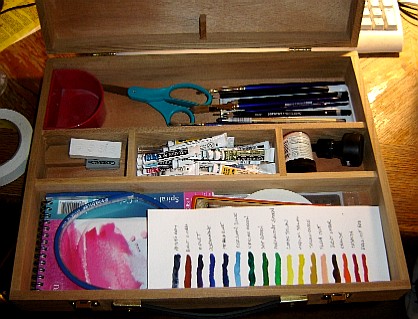 And I've decided to start over with the painting... it's like trying to paint inside of a cup for all the warping the paper did. The rest of the night belongs to me and Suzanne Vega. I downloaded Solitude Standing and Days of Open Hand the other night. The gentle rocking motion of Gypsy is perfect.  |
|
|
My mom, god bless her, loves my artwork and bought me some watercolor paper for Christmas. She went to the local art store and, at the direction of the salesperson, spent a mint. One of the items she bought was watercolor canvas, a concept I'd never heard. It is essentially that: very thin canvas, supposedly designed to be used for watercolors. I've never tried it, and my initial thought was, "Gee, how does that stuff stand up to water??" But I figured I would give it a go in painting the guy and his plants. 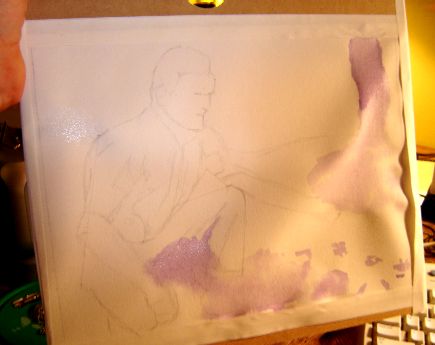 Some of you have written to me and mentioned in the comments that you might try your hand at painting. As you can see, "watercolor canvas" can't even stand up to the most simple of washes. Watercolor canvas is an oxymoron and a product disaster. Unless you're hoping that your paintings turn out in 3-D relief, skip the farce of this "paper." My recommendation: go for the 140 lb paper. I've been using Winsor & Newton paper, and it's fine. Use 300 lb for finished works that you want to hang somewhere. But steer clear of anything else. It wasn't all wasted effort though... I'm getting better at drawing this guy and I'm strengthening my sense of how I want to paint this. |
|
|
I don't know what I think of this yet, but what I wanted to do this morning was roughly skecth out in watercolor the colors I would use, and I wanted to apply some pen and ink, part of the stuff that I bought yesterday. 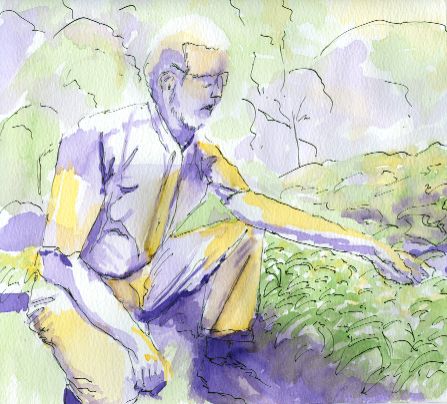 As I was working with it, I got a lot of satisfaction from laying down the violet wash. The green works for me as well. What I think I might change though is the gamboge (yellow-orange) hue. Maybe more of a light sienna (brown) would be better. The pen and ink was fun and definitely something with which I'll experiment more often. And boy howdy, it is a beautiful day today. |
|
|
I'm new at painting, so I'm backtracking to get some basics. Clothes... that's a good place to work. Folds of clothing escape me, so I started this at lunch and finished it this evening. 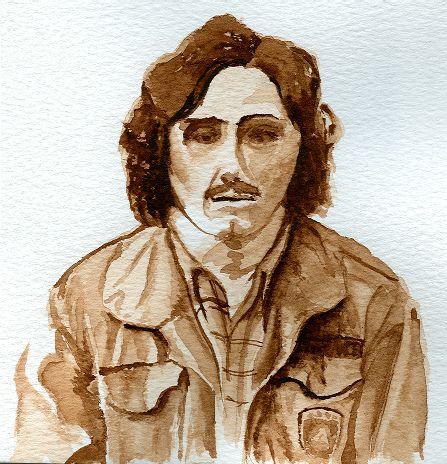 Does it look like a plaid shirt and an Army jacket? |
|
|
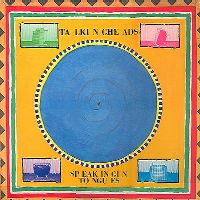 My favorite song at the moment is "This Must Be the Place" by the Talking Heads. I owned the Speaking in Tongues album when it first came out in the early 80's, but I swear I never liked David Byrne's compositions and texturing as much as I do today. Where was my head back then?? My favorite song at the moment is "This Must Be the Place" by the Talking Heads. I owned the Speaking in Tongues album when it first came out in the early 80's, but I swear I never liked David Byrne's compositions and texturing as much as I do today. Where was my head back then??
In "This Must Be the Place," there's one part of the song that goes: "Home is where I want to be, but I guess I'm already there." No idea why, but that's sticking with me... and I don't usually notice lyrics. Mr. Byrne - he's a genius. It's funny how related music seems to painting lately. The layers and textures... I can see the transparency of the song as though it were displayed in front of me, like watercolor washes. I had lunch with a friend of mine today whom I've known for years. His birthday is in two days and we take each other out for lunch on our birthdays. We stopped at the restaurant where a childhood friend of mine works. They'd never met, so I introduced them. It's odd, but I find a lot of common threads running together lately. From "Once in a Lifetime," I hear in my ear, "You may ask yourself, 'Where does that highway lead to?' You may ask yourself, 'Am I right? Am I wrong?'" Someone once told me that we only get angry when we don't get our way. I find that painting reduces my desire to change the world, as I've sought to do in the past. Instead, I want to observe it as it is and enjoy it for what it is. I think everyone should try painting. It's changing my life. |
|
|
It's not often that I have a difficult day at work. But today started out with a heated discussion and then the morning slid from there. Lunch, which is my painting break, was a very, very welcome respite and started a nice turn-around for me. On lunch, I wanted to work more on folds of clothing and monochromatic shading, so I typed "woman coat" into Google images and for some reason, a picture of children came up. The girl in the picture was so delighted and happy that I wanted to absorb her mood. She felt like sunshine to me, so I tried yellow. I like the result. It fit her well.  You can click on her if you want to see the source photo. And from there on out, the day was great. Tonight, I should turn on the Graffiti portion of the site. Let's see how far I get. |
|
|
I had wanted to release the Graffiti portion of the website last night, but unfortunately, I didn't. After hanging with my kids for a while, I did two computer caricatures for a woman with whom I work (she asked if I would work on something artsy of her children) and then I hit a brick wall called "fatigue." So I lay on the couch, Da Vinci Code in hand and fell asleep reading. My daughter read the book about a year ago and told me that I need to read it. Then a friend recommended it to me, knowing my religious stance, and so I've started it. I'm not too far in yet. Langdon has observed the body and just met Ms. Neveu (sp?). History is the collective point of view of those who best marketed or offered their points of view. It's not necessarily what actually happened. The subjective nature of memory, screened through our biases and experiences, shade our view. As individuals, we're too small to capture "the truth" ourselves. At this point in history, I think that a lot of people now notice that the version of events given in the media are not necessarily what happened. What they show may in fact be true, but does it best represent the truth? It's an open question. My opinion is that some reporters are good at getting the gist of the facts to us, and others are obscenely prejudiced and too driven by agenda to be trusted. (I did a fairly robust study of press bias last fall during the election and came away with the assessment that the Associated Press has too many reporters who favor the slant of the Democrats - and as I mentioned, some obscenely so, such as Liz Sidoti.) My daughter has a deep fascination with history. I've never met a high school student so fluent with information about history as she is. For her, the Da Vinci Code proved riveting. Early church history is a murky topic in many respects, but the translated documents from 2nd and 3rd century forward are fairly available on the web for viewing. You can start with Tertullian and gobble up the writings of those involved in early Christianity. But I'm quite sure that much has been suppressed. What we know today of early church history is what has been allowed to survive. I don't know that the truth of early history matters much to a person's elemental faith. I don't expect the book to change my own opinions, but like my daughter, I'm fascinated with Dan Brown's grasp of information. |
|
|
At lunch, I've been browsing the web sites of local bloggers, and two posts stood out. The first post was Doug and Jody's, and their daughter, little Brenna, had a tough night last night. First Doug came to Brenna's rescue, and then Jody. It reminded me of how many times we, as parents, run to the aid of our kids and bond so deeply with them by doing so. And then I came across Kris' post, about her nine-year-old daughter's trip to the neurologist. After reading what she wrote, I felt as though someone had tapped my leg and every fluid in me had drained out...
The problem is that they now suspect she has what's called "Lennox-Gastaut", which is one of the severest forms of epilepsy that a child can have. It doesn't look too great, to be honest. It's an intractable form, meaning that no medication seems to give any improvement in seizure control, and it can grow progressively worse over time. One web site said that up to 10% of LG kids don't live past eleven.
If you pray, pray for Alice. And if you don't pray, pray for her anyway. Twice daily.I had started work on the fella on the left-hand side of this picture, but felt compelled to write instead. Being a parent is the toughest job in the world. |
|
|
|
|
|
|
|